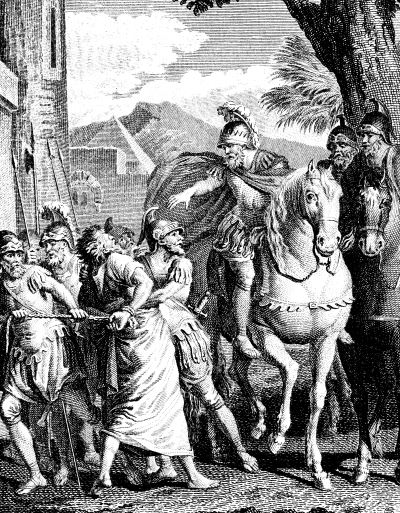

The revival took place in the southern Kingdom of Judah, during the reign of King Asa.

The first king of Israel was Saul. This map shows the extent of land he ruled.

United Kingdom of Israel under Kings David and Solomon
Background Information—The United Monarchy
The reigns of Kings Saul, David, and Solomon are traditionally dated between 1047 B.C. and 930 B.C. With the succession of Solomon’s son, Rehoboam, around 930 B.C., the country split into two kingdoms 1 Kings 12:1-20;.2 Chronicles 10:1-19).
► The Kingdom of Israel in the north
► The Kingdom of Judah in the south

The southern kingdom of Judah was ruled by the descendants of David and was made up of two tribes, Judah and Benjamin. The northern Kingdom of Israel was made up of the remaining ten tribes of Israel: Simeon, Reuben, Gad, Ephraim, Issachar, Naphtali, Manasseh, Asher, Zebulun, and Dan.
This revival account is focusing on the southern Kingdom of Judah and its king, Asa, who came to power around 926 B.C.

List of kings of the Kingdoms of Israel and Judah
Godly Kings and Ungodly Kings
Out of the kings that ruled the northern Kingdom of Israel, none were godly. Of the kings that ruled the southern Kingdom of Judah, there were five who were godly, and they were:
1. Asa (1 Kings 15:11)
2. Jehoshaphat (2 Chronicles 20:32)
3. Joash (2 Kings 12:2)
4. Hezekiah (2 Kings 18:5)
5. Josiah (2 Kings 23:25)
Condition of the Nation when King Asa Came to the Throne
King Asa was preceded by three kings who grew increasingly wicked, leading the Kingdom of Judah further and further away from God.
1. Solomon
The Lord was very angry with Solomon, for his heart had turned away form the Lord (1 Kings 11:8-10).
2. Rehoboam
Rehoboam…abandoned the Law of the Lord, and all Israel followed him in this sin (2 Chronicles 12:1).
3. Abijah
He committed the same sins as his father before him (1 Kings 15:3).
The spiritual condition of the nation when Asa came to the throne left him with many challenges.
► Idolatry was rampant.
► Perversity had filled the land, with idolatrous practices involving male and female prostitutes.
King Asa’s First Revival
During the first ten years of Asa’s reign he enjoyed relative peace, and he used that time to bring the nation back to God (2 Chronicles 14:1).
► Going from town to town, he removed all altars and high places of worship dedicated to foreign gods (1 Kings 15:12;.2 Chronicles 14:3).
Wisdom Exercised during Times of Peace
As Asa took these dramatic steps spiritually, God blessed him with peace. This peace enabled him to invest time in strengthening his kingdom (2 Chronicles 14:7).
► He fortified the land (2 Chronicles 14:7).
► He built up his army to 580,000 (2 Chronicles 14:8).

Path the Ethiopians took on their route to attack Judah
Military Victory at Mareshah
When an Ethiopian army marched against Judah, with 1,000,000 soldiers and 300 chariots–a force close to twice as large as Judah’s–Asa called out to God for help, and victory was given (2 Chronicles 14:9-15).
► The Ethiopians were chased all the way to Gerar (2 Chronicles 14:13).
► The Philistine cities surrounding Gerar were also destroyed, allowing the army of Judah to capture and carry “off a vast amount of plunder” (2 Chronicles 14:14-15).

Map shows Mareshah and Gerar
King Asa’s Second Revival
When the army returned from the victory at Mareshah, the prophet Azariah greeted Asa and all the people, and reminded them that this success was from the Lord (2 Chronicles 15:1-2). Azariah also reminded them of the days under the previous kings, when “dark times” covered the land (2 Chronicles 15:3-6). And he ended with an encouraging word, that if they remain faithful, their “work will be rewarded” (2 Chronicles 15:7).
Asa took Azariah’s advice and for 5 years he doubled his efforts in removing idols and immoral practices throughout the land and cleaned out and restored worship in the Lord’s Temple (2 Chronicles 15:8).
Covenant with the Lord Reconfirmed
During Asa’s 15th year of ruling Judah, he gathered all the people to Jerusalem to offer sacrifices to the Lord and to enter into a covenant with Him (2 Chronicles 15:9-14). This covenant added more force to his efforts, and as the law of Moses was drawn upon, there was a threat made to carry out those laws, and they involved capital punishment for anyone who maintained their pagan practices (Deuteronomy 17:2-5; Exodus 22:18).
Due to this renewed dedication, Judah experienced peace for 20 more years.
Then they entered into a covenant to seek the Lord, the God of their ancestors, with all their heart and soul. They agreed that anyone who refused to seek the Lord, the God of Israel, would be put to death—whether young or old, man or woman. They shouted out their oath of loyalty to the Lord with trumpets blaring and rams’ horns sounding. All in Judah were happy about this covenant, for they had entered into it with all their heart. They earnestly sought after God, and they found him. And the Lord gave them rest from their enemies on every side. (2 Chronicles 15:12-15).
Additional Purification Steps of King Asa
► He banished from the land all the male and female prostitutes that were connected with idolatrous practices (1 Kings 15:12).
► He removed his grandmother from her position as the queen mother.
King Asa even deposed his grandmother Maacah from her position as queen mother because she had made an obscene Asherah pole. He cut down her obscene pole, broke it up, and burned it in the Kidron Valley (1 Kings 15:13;.2 Chronicles 15:16).
► He remained completely faithful to the Lord throughout his life (1 Kings 15:14).
► He was faithful with finances, giving to God that which belonged to Him (1 Kings 15:15;.2 Chronicles 15:18).

Prophet Hanani, tied up and led away to prison after rebuking King Asa
King Asa’s Good but Not Perfect Record
For the first 36 years of King Asa’s reign he sought God. During his last 5 years he had some shortcomings.
► When a military conflict developed between Judah and the Northern Kingdom of Israel, Asa placed his trust in an alliance with the king of Aram (2 Chronicles 16:1-6).
► The prophet Hanani rebuked King Asa for placing his trust in the king of Aram and not in God. Angered by that rebuke, King Asa put Hanani in prison. In addition, Asa began oppressing some of his people (2 Chronicles 16:7-10).
In the 39th year of King Asa’s reign he developed a serious foot disease.
► Instead of seeking the Lord’s help, he turned to physicians (who possibly used incantations and magical remedies).
Good Report from Elijah the Prophet
A number of years after the death of King Asa, the prophet Elijah rebuked Asa’s grandson, King Jehoram of Judah, because he “had abandoned the Lord,” and “led the people of Jerusalem and Judah to give themselves to pagan gods and to go astray” (2 Chronicles 21:10-11). Elijah then honored King Asa by saying this to Jehoram:
You have not followed the good example of your father, Jehoshaphat, or your grandfather King Asa of Judah (2 Chronicles 21:12).
So even though King Asa did not have a perfect record, he was remembered by one of the most renowned prophets, Elijah, as having presented a good example for others to follow.
Return to List of Revival Stories
Chet & Phyllis Swearingen:
Office: (260) 920-8248
romans1015@outlook.com
Beautiful Feet
P.O. Box 915
Auburn, IN 46706

